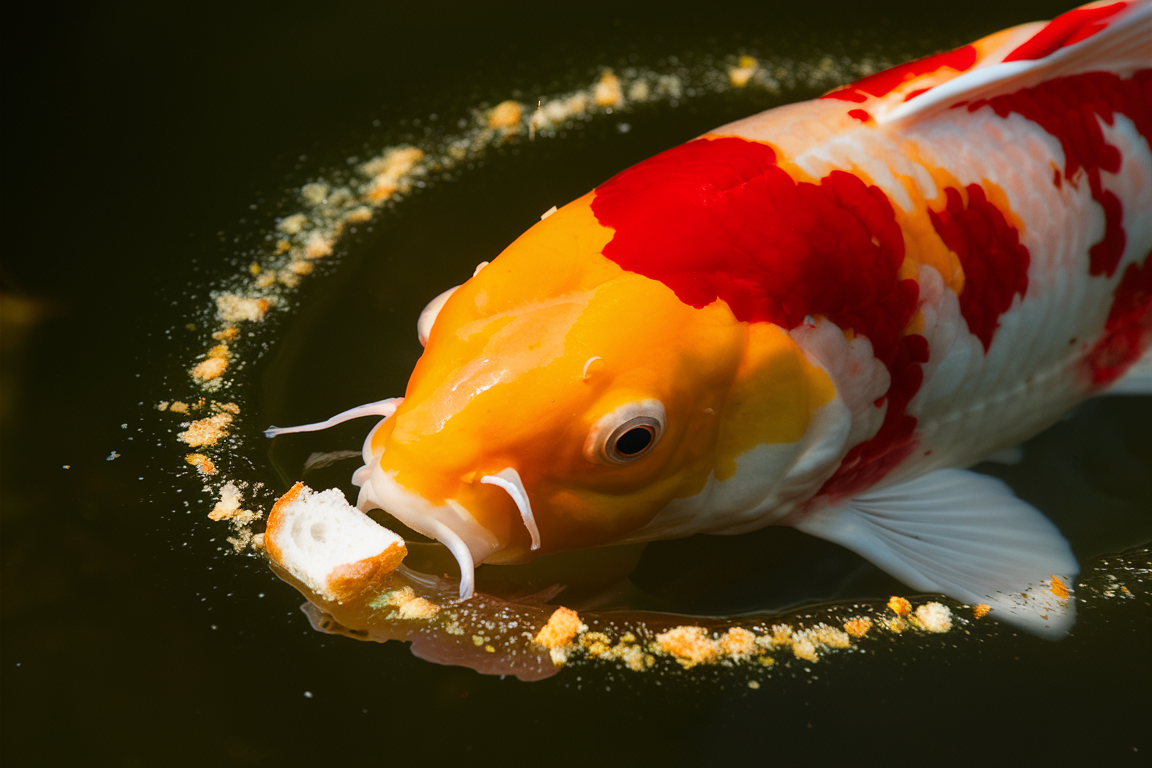Koi fish, with their vibrant colors and graceful movements, are a beloved addition to any pond or water garden. But when it comes to feeding these captivating creatures, many koi enthusiasts have a common question: do koi fish eat bread? While it may seem like a harmless treat, the answer is more complex than you might think. Let’s follow Love My Koi!
The Truth About Bread and Koi: A Delicate Balance

While koi may readily consume bread, it’s not a suitable food source for them. Bread lacks the essential nutrients that koi need to thrive, and its impact on their health can be detrimental.
1. Nutritional Deficiencies:
- Lack of Essential Nutrients: Bread is primarily composed of carbohydrates, with minimal protein, fats, and vitamins. Koi require a balanced diet rich in protein, essential fatty acids, and vitamins to support their growth, health, and immune system.
- Bloating and Digestive Issues: Bread can cause bloating and digestive issues in koi, as it is difficult to digest and can ferment in their stomachs. This can lead to constipation, gas, and even intestinal blockages.
2. Water Quality:
- Increased Organic Load: Bread, when consumed by koi, can contribute to an increase in organic load in the pond water. As bread decomposes, it releases harmful substances like ammonia and nitrates, which can negatively impact water quality.
- Algae Blooms: The excess nutrients from bread can also lead to algae blooms, which can cloud the water, block sunlight, and deplete oxygen levels.
3. Health Risks:
- Obesity and Liver Problems: A diet high in carbohydrates, like bread, can lead to obesity and liver problems in koi. Obesity can make them more susceptible to diseases and reduce their lifespan.
- Fungal Infections: Bread can attract bacteria and fungi, which can lead to infections in koi, particularly in their digestive system.
The Best Diet for Koi: A Balanced Approach
To ensure the health and well-being of your koi, it’s essential to provide them with a balanced diet that meets their nutritional needs. Here are some key elements of a healthy koi diet:
1. High-Quality Koi Pellets:
- Complete Nutrition: Koi pellets are specifically formulated to provide koi with all the essential nutrients they need, including protein, fats, vitamins, and minerals.
- Controlled Feeding: Pellets allow for controlled feeding, ensuring that koi receive the right amount of food without overfeeding.
2. Fresh Vegetables:
- Dietary Variety: Fresh vegetables, like spinach, kale, zucchini, and peas, provide additional vitamins, minerals, and fiber.
- Natural Enrichment: Vegetables also provide a natural enrichment for koi, stimulating their foraging instincts and keeping them mentally engaged.
3. Occasional Treats:
- Moderation is Key: Occasional treats, like bloodworms, brine shrimp, and small amounts of cooked meat, can be given in moderation.
- Variety and Enrichment: Treats provide variety and enrichment to the koi’s diet, but they should not constitute a significant portion of their overall food intake.
Frequently Asked Questions About Koi Fish Diets
1. How often should I feed my koi?
Koi should be fed once or twice a day, depending on their size and activity level.
2. How much should I feed my koi?
Koi should be fed an amount of food that they can consume within 5-10 minutes.
3. What are the signs of overfeeding koi?
Signs of overfeeding include excessive waste, cloudy water, and koi that are always begging for food.
4. Can I feed my koi fish flakes?
While fish flakes are suitable for some fish species, they are not ideal for koi. Koi pellets are generally preferred.
5. Can I feed my koi fish scraps?
It’s not recommended to feed koi fish scraps, as they can contain harmful bacteria and parasites.
Conclusion: A Healthy and Happy Life for Your Koi
While it may be tempting to share a piece of bread with your koi, it’s important to remember that their dietary needs are different from ours. By providing them with a balanced diet of high-quality koi pellets, fresh vegetables, and occasional treats, you can ensure their health, happiness, and longevity.

Related Posts
Baby Koi Fish: A Guide to Raising These Adorable Aquatic Jewels
Koi Bacterial Infection: Recognizing, Treating, and Preventing These Aquatic Threats
Best Food for Koi Fish: Nourishing Your Aquatic Jewels